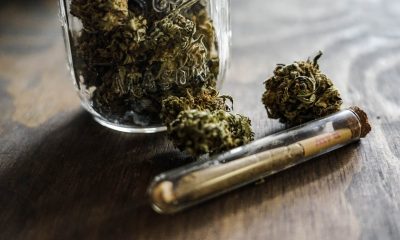Cannabis
What Are the Obstacles Affecting the Cannabis Industry in Colombia?
One obstacle that is affecting the cannabis industry in Colombia is the lack of bank loans. According to Analdex, regarding the increase in cannabis exports, it is evident that there was an increase of more than 3,000% between 2019 and 2022. During 2022, the country had a growth of 89.1% compared to 2021, i.e., it managed to make total exports of 9.6 million. This is also evidenced by Dane and ProColombia.

On May 6th, the Global March for the Liberation of Marijuana took place. Colombia was not left out of the event, so the promoters of movements that seek free and safe cannabis consumption in the country set meeting points to make a massive call to the need for action by the State. In the midst of the situation, experts on the subject have expressed their main concerns regarding the progress of the processes surrounding the use and commercialization of cannabis in the country.
According to what was said by the president of the Colombian Association of Cannabis Industries (Asocolcanna), Miguel Samper Strouss, in an interview given to Bloomerang Línea, the situation of cannabis companies ‘is critical’. “You could say that the cannabis industry is in intensive care,” he stressed in his talk with the aforementioned news portal.
“Those who are part of this industry fear that the cure will be worse than the disease and that all licenses will be released, which would generate a lack of control in production and problems when exporting easily because they would not meet the quality standards demanded by the countries that buy the product,” added Miguel Samper, in testimonies rescued by the RCN channel news program.
Out of 57 thousand hectares licensed for psychoactive and non-psychoactive cannabis, the expert explained, only 26 are being planted. In addition, about 40% of the companies that managed to get their license in the last seven years have stopped their operations. This is without taking into account the delays in the registrations that must be carried out with the Invima (National Institute for the Surveillance of Medicines and Food).
Read more about the cannabis industry in Colombia and find other important cannabis news with the Hemp.im mobile app.
One obstacle that is affecting the cannabis industry in Colombia is the lack of bank loans
“The delays in the registrations with Invima, as well as the delay of the National Narcotics Fund, which can take between 2 and 3 months to approve an export certification for phytotherapeutic products, are situations that have generated considerable losses for the sector”, added Diego Ruiz, director of Regulatory Affairs of FCM Global, in a statement drafted by Analdex, the National Association of Foreign Trade.
This same expert assured that although the Government is putting several of its efforts to export dried flowers and seeds, “others such as phytotherapeutic products are being left behind.”
According to what Willam Calderón, president of the Santander Cannabis Association, revealed, another obstacle to which they are exposed is the lack of bank credits. “For example, the Agrarian Bank lends to cannabis entrepreneurs, but the requirement is that they have within their assets an amount not less than 3 billion pesos. Very few entrepreneurs have that kind of equity to access credits and this is another factor that has slowed down the industry in Colombia,” he said in a conversation with RCN News.
In fact, Rodrigo Patiño, regional manager of Antioquia of Analdex, added to this testimony, assuring that “we must continue working on the mechanisms of bankarization, since there is a lack of an adequate offer of inclusion in the financial system, due to multiple factors of these so-called sensitive industries in terms of risk. For this sector, having a bank account that allows foreign currency withdrawals is quite an odyssey and great efforts and investments have to be made in terms of compliance in order not to lose it. Nothing is gained if we sell abroad and we have no way to bring in the foreign currency”.
According to Analdex, regarding the increase in exports of this product, it is evident that there was an increase of more than 3,000% between 2019 and 2022. During 2022, the country had a growth of 89.1% compared to 2021, i.e., it managed to make total exports of 9.6 million. This is also evidenced by Dane and ProColombia.
Among the countries that bought the most Colombian medical cannabis in 2022 are Argentina with $3.8 million, Brazil ($1.3 million), Australia ($1.3 million), Germany ($649,640), Switzerland ($595,549), and the United States ($552754).
__
(Featured image by PublicDomainPictures via Pixabay)
DISCLAIMER: This article was written by a third-party contributor and does not reflect the opinion of Born2Invest, its management, staff or its associates. Please review our disclaimer for more information.
This article may include forward-looking statements. These forward-looking statements generally are identified by the words “believe,” “project,” “estimate,” “become,” “plan,” “will,” and similar expressions. These forward-looking statements involve known and unknown risks as well as uncertainties, including those discussed in the following cautionary statements and elsewhere in this article and on this site. Although the Company may believe that its expectations are based on reasonable assumptions, the actual results that the Company may achieve may differ materially from any forward-looking statements, which reflect the opinions of the management of the Company only as of the date hereof. Additionally, please make sure to read these important disclosures.
First published in infobae, a third-party contributor translated and adapted the article from the original. In case of discrepancy, the original will prevail.
Although we made reasonable efforts to provide accurate translations, some parts may be incorrect. Born2Invest assumes no responsibility for errors, omissions or ambiguities in the translations provided on this website. Any person or entity relying on translated content does so at their own risk. Born2Invest is not responsible for losses caused by such reliance on the accuracy or reliability of translated information. If you wish to report an error or inaccuracy in the translation, we encourage you to contact us.

-

 Fintech2 weeks ago
Fintech2 weeks agoMuzinich and Nao Partner to Open Private Credit Fund to Retail Investors
-

 Fintech22 hours ago
Fintech22 hours agoRipple and Mercado Bitcoin Expand RWA Tokenization on XRPL
-

 Crypto1 week ago
Crypto1 week agoBitcoin Traders on DEXs Brace for Downturn Despite Price Rally
-

 Crowdfunding6 days ago
Crowdfunding6 days agoFrom Confiscation to Cooperation: Funding Casa de la PAZ’s Social Transformation
























